Related Research Articles
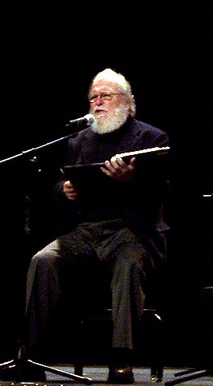
Peter Schickele was an American composer, musical educator and parodist, best known for comedy albums featuring his music, which he presented as being composed by the fictional P.D.Q. Bach. He also hosted a long-running weekly radio program called Schickele Mix.
The Abduction of Figaro is a comic opera in three acts, described as "A Simply Grand Opera by P. D. Q. Bach", by Peter Schickele. It is a parody of opera in general, and the title is a play on two operas by Wolfgang Amadeus Mozart: The Abduction from the Seraglio, K. 384, and The Marriage of Figaro, K. 492. Those two operas, as well as Così fan tutte and Don Giovanni, and Gilbert and Sullivan's The Pirates of Penzance are among the core inspirations for the piece. The Abduction of Figaro is numbered S. 384, 492 in Schickele's catalogue of works.

Johann Ludwig Bach was a German composer and violinist.
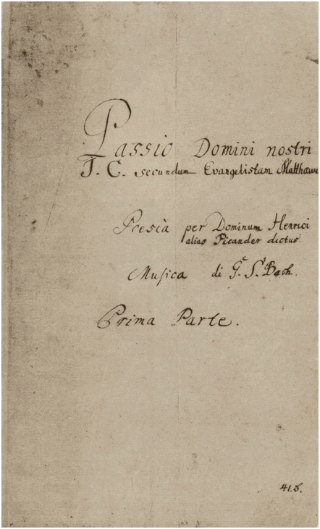
The St Matthew Passion, BWV 244, is a Passion, a sacred oratorio written by Johann Sebastian Bach in 1727 for solo voices, double choir and double orchestra, with libretto by Picander. It sets the 26th and 27th chapters of the Gospel of Matthew to music, with interspersed chorales and arias. It is widely regarded as one of the masterpieces of Baroque sacred music. The original Latin title Passio Domini nostri J.C. secundum Evangelistam Matthæum translates to "The Passion of our Lord Jesus Christ according to the Evangelist Matthew".
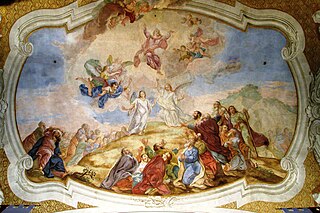
Lobet Gott in seinen Reichen, BWV 11, known as the Ascension Oratorio, is an oratorio by Johann Sebastian Bach, marked by him as Oratorium In Festo Ascensionis Xsti, composed for the service for Ascension and probably first performed on 15 May 1738.

The Ill-Conceived P. D. Q. Bach Anthology is a collection of works by Peter Schickele writing as P. D. Q. Bach originally recorded on the Telarc label by the composer.

Joshua is an oratorio by George Frideric Handel. It was composed in a month, from 19 July 1747 to 19 August 1747, six months before the beginning of the oratorio season. Joshua is Handel's fourth oratorio based on a libretto by Thomas Morell. The oratorio premiered on 9 March 1748 at the Covent Garden Theatre, London. Joshua is based on the Biblical story of Joshua as the leader of the ancient Israelites. The story follows the Israelites from their passage over the Jordan River into Caanan and through the Battle of Jericho. The work also includes a love story elaborated from a few hints in the Biblical narrative between Caleb's daughter Achsah and Othniel, a young soldier.

An Hysteric Return: P.D.Q. Bach at Carnegie Hall is live recording of a P. D. Q. Bach concert in Carnegie Hall and was released on Vanguard Records in 1966.

The Stoned Guest is "the premiere recording of the Half-Act Opera by P. D. Q. Bach", the pseudonym used by Peter Schickele for parodic works. It was released on Vanguard Records in 1970. The title is a play on Dargomyzhsky's opera The Stone Guest. The record is a pseudo-radio broadcast hosted by "Milton Host" including an appearance by "Paul Henry Lung" as a contestant on the intermission game "Opera Whiz" hosted by Schickele.

The Wurst of P. D. Q. Bach is a collection of works by Peter Schickele under his comic pseudonym of P. D. Q. Bach originally recorded on the Vanguard Records label by the composer. It includes "lowlights" from four different Vanguard albums: Peter Schickele Presents an Evening with P. D. Q. Bach (1807–1742)?, An Hysteric Return: P.D.Q. Bach at Carnegie Hall, Report from Hoople: P. D. Q. Bach on the Air, and P. D. Q. Bach's half-act opera The Stoned Guest. Wurst is the German word for sausage, with the album cover photograph set in a sausage shop.

P.D.Q. Bach in Houston: We Have a Problem! is a live performance celebrating 40 years of P. D. Q. Bach. This performance features Professor Peter Schickele with Orchestra X conducted by Peter Jacoby. It includes never-before-recorded performances of "Trumpet Involuntary" movement of Iphigenia in Brooklyn, and also the rounds Odden und Enden.

An Occasional Oratorio is an oratorio by George Frideric Handel, based upon a libretto by Newburgh Hamilton after the poetry of John Milton and Edmund Spenser. The work was written in the midst of the Jacobite rising of 1745–1746, the attempt to overthrow Handel's patrons – the Hanoverian monarchy under George II – and replace them with a Stuart restoration under Charles Edward Stuart, "Bonnie Prince Charlie". The Occasional Oratorio is unique among Handel's works which he labelled "oratorio" in that it does not tell a story or contain elements of a drama, but was intended as a defiant and patriotic rallying piece.

The Brockes Passion, or Der für die Sünde der Welt gemarterte und sterbende Jesus, is a German oratorio, libretto by Barthold Heinrich Brockes, first published in 1712 and seeing 30 or so more editions over the following 15 years.

Entfliehet, verschwindet, entweichet, ihr Sorgen, BWV 249a, is a secular cantata by Johann Sebastian Bach. First performed in 1725, the work is also known as "Shepherd Cantata" or "Shepherds' Cantata". Bach reworked the music in his Easter Oratorio.

Jesus Christus ist um unsrer Missetat willen verwundet is a St Mark Passion which originated in the early 18th century and is most often attributed to Reinhard Keiser. It may also have been composed by his father Gottfried or by Friedrich Nicolaus Bruhns. Johann Sebastian Bach produced three performance versions of the Passion, the last of which is a pasticcio with arias from George Frideric Handel's Brockes Passion. There are two other extant 18th-century versions of the Passion, both of them independent of Bach's versions. The Passion was performed in at least three cities in the first half of the 18th century: in Hamburg in 1707 and 1711, in Weimar around 1712, and in Leipzig in 1726 and around 1747.

Der Tod Jesu is an oratorio libretto by Karl Wilhelm Ramler. In its setting by Carl Heinrich Graun in 1755, it was the most often performed Passion of the 18th century in Germany.
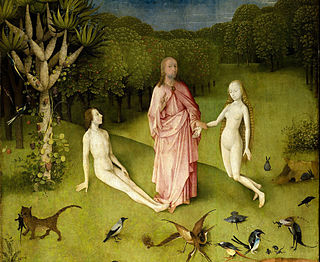
The Creation, the oratorio by Joseph Haydn, is structured in three parts. He composed it in 1796–1798 on German text as Die Schöpfung. The work is set for soloists, chorus and orchestra. Its movements are listed in tables for their form, voice, key, tempo marking, time signature and source.
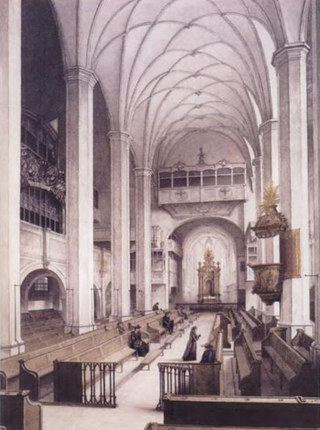
Meinen Jesum laß ich nicht, BWV 124, is a church cantata written by Johann Sebastian Bach. He composed the chorale cantata in Leipzig for the first Sunday after the Epiphany and first performed it on 7 January 1725. It is based on the hymn "Meinen Jesum laß ich nicht" by Christian Keymann.

Fallt mit Danken, fallt mit Loben, BWV 248IV, is a Christmas cantata by Johann Sebastian Bach, composed in 1734 as Part IV of his six-part Christmas Oratorio. Each part of the oratorio is a cantata, written for performance on one of the feast days of the Christmas period. Fallt mit Danken, fallt mit Loben is meant for the New Year's Day feast of the circumcision and naming of Jesus. Based on a libretto by an unknown author, it tells the naming of Jesus from the Nativity of Jesus, according to the Gospel of Luke.
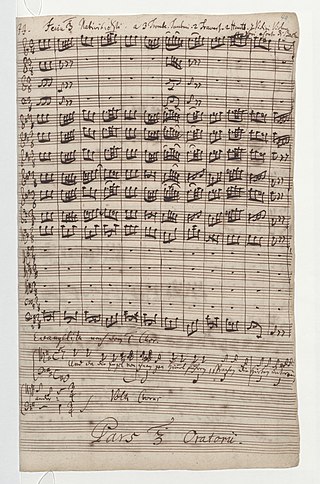
Herrscher des Himmels, erhöre das Lallen, BWV 248III, is a 1734 church cantata for the third day of Christmas (27 December) which Johann Sebastian Bach composed as the third part of his Christmas Oratorio. The Christmas cantata was first performed in 1734, in Leipzig. Bach was then Thomaskantor, responsible for music at four churches in Leipzig, a position he had assumed in 1723.